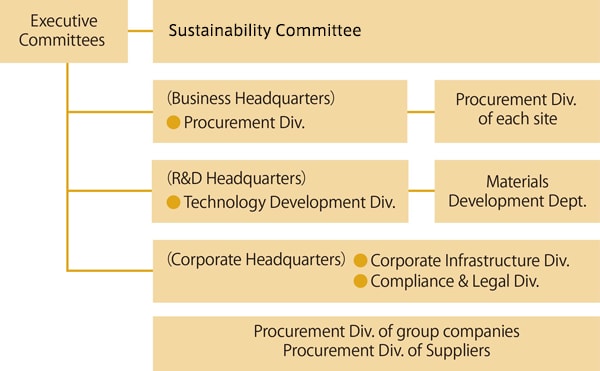Sustainable supply chain
- Issues to be addressed
- Guiding Policies
- TOYO TIRE’s SDGs (Ideal Status in 2030)
- Goals
- Responsibilities (April 2021)
- Activity Promotion System (April 2021)
- Grievance Mechanism
- Activities in 2020
Issues to be addressed
- Supply chain management (Society and Environment)
It essential to TOYO TIRE’ sustainable growth that we understand the impact of its activities on the supply chain and engage in resolving social issues faced by the supply chain, as a global company. In addition, we believe that it is only through a sound supply chain that we can deliver safer, more secure products and services to consumers. To this end, we position contributing to sharing the Group’s thoughts on sustainable procurement with business partners and solving global social problems throughout the supply chain as issues that should be addressed with priority.
Affected Stakeholders
Directly: Business Partners, Local Communities
Indirectly: Shareholders and Investors, Creditors, Business Organizations
Guiding Policies
We formulated the Toyo Tire Group’s Basic Purchasing Policies in order to comply with laws and regulations related to free competition and fair transactions in every country and region as well as pursuing appropriate quality and price through fair transactions.
“TOYO TIRE Group CSR Procurement Guidelines” and “Sustainable Natural Rubber Procurement Policy” were also established. We will promote sustainable purchasing in collaboration with business partners, the goal of which is to reduce, prevent, and minimize the negative impact that business activities have or could have on the environment or society and simultaneously raise corporate value and competitiveness. We will also secure stable supplies.
Toyo Tire Group Basic Purchasing Policies
- Compliance
Comply with applicable laws, regulations, and social norms and strictly maintain confidentiality in all purchasing activities. - Partnership
Build and maintain an honest, healthy, and cooperative relationship with suppliers as equal partners.
Aim for mutual growth and development through enhanced communication and stronger bonds of mutual trust. - Transparent and fair trade
When selecting suppliers, assess them from a comprehensive standpoint that takes into account their willingness to share and collaborate on CSR initiatives as well as on quality, price, delivery, and sustainable supply capacity. - Environmental responsibility
Promote purchasing activities that also aim to reduce impact to the global environment.
TOYO TIRE Group CSR Procurement Guidelines
TOYO TIRE’s SDGs (Ideal Status in 2030)
We will contribute to create a society where ethical consumption is standardized by building a sustainable supply chain through cooperation with stakeholders.
Goals
We share our sustainable purchasing policy with all business partners and efforts are made to ascertain conditions throughout the supply chain and conduct fair transactions.
Responsibilities (April 2021)
Corporate Officer & Vice President of Business Headquarters
Activity Promotion System (April 2021)

TOYO TIRE belongs to the following trade associations:
Grievance Mechanism
- Reporting Hotline (Creating an Internal Control System) *Targets: Employees, Business Partners
- Customer Relations Department *Targets: Customers, Local Communities
- Inquiry Form (on the Website) *Targets: Customers, Shareholders and Investors, NGOs
- Consultation Desk for Compliance with the Antimonopoly Act *Targets: Employees
Activities in 2020
Sustainability
- Message from the President
- TOYO TIRE Value creation
- TOYO TIRE Sustainability
-
TOYO TIRE Materiality
- Help create a society of sustainable mobility / Support the enjoyment of mobility for all
- Support diverse talent with motivating challenges and job satisfaction
- Continue innovating next-generation mobility technology
- Pursue decarbonization in all corporate activities
- Promote supply chain sustainability
- Ensure the fundamentals of manufacturing: quality and safety
-
ESG Activities
- E: Environment
- S: Upholding human rights
- S: Managing occupational health and safety to global standards
- S: Crisis management (responding resiliently to natural disasters, infections and other crises)
- S: Working with local communities (Helping solve local issues)
- G: Sound governance
- G: Compliance
- G: Risk management
- G: Information security
- G: Promoting digital transformation (borderless and centralized business management through ERP reform)
- External Recognition
- Report Library
- ESG Data
- ESG Data/Survey Index
- GRI Content Index
- Communication on Progress (CoP) Index
- Editorial Policy

